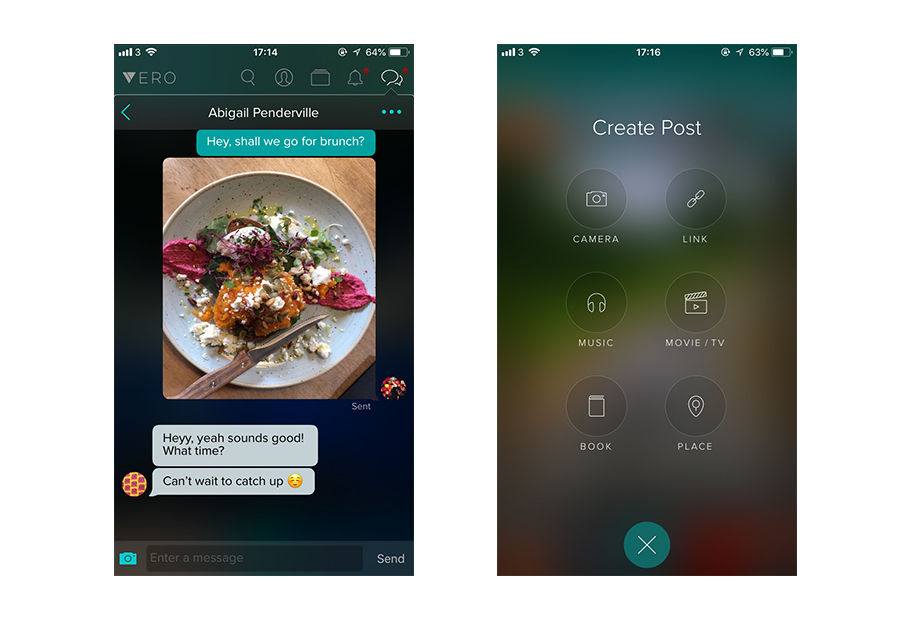
Vero is three years old and has over 4 million users, but I bet you’ve never heard of it. Vero is a social media platform with two distinct selling points: it’s subscription-based and ad-free. Whilst these key features may initially sound harmless, on deeper inspection they begin to raise questions around how the platform will affect digital marketing. Is Vero going to force brands to look for new ways to advertise online?
So what is Vero?
It’s an online space where you can post images, share links, music, film, TV show and book recommendations as well as locations. The range of content that you can post allows it to be more than just a photo-sharing platform. It puts the user in control, cuts through all advertising and encourages organic and authentic connections.
While it’s being advertised as a subscription-based service, the platform is currently offering a “Free For Life” offer. Vero’s ad-free policy ties in with its manifesto of creating a people-first social networking platform that is focused “solely on delivering the best social experience instead of trying to find new ways to monetize our users’ behavior or tricking them back into the app with notifications.”

As well as Vero’s unique ethos, what differentiates it from the current social media powerhouses is its lack of algorithms, promise to keep its users’ data private and its usage tracker that tells users how much time they have spent on the app. Sounds awfully like all of the features that their social network competitors are missing. For example, Instagram caused outrage in 2016 when it announced that they were introducing a new algorithm which would affect the visibility of many people’s posts. The backlash received was monumental yet Instagram have stuck by their decision, much to the displeasure of their users. It seems as though Vero have done their research and have created a platform which functions how their users want it to.
“We’re not doing this as a fly-by-night thing. We may or may not catch on. We’re really sincere about what it is we’re trying to build. And we have big plans ahead.”
- Rafic Hariri, Vero Founder.
Earlier this year the social networking platform had fewer than 150,000 downloads. Following the Facebook scandal, people flocked to Vero and it became the most downloaded app with over 4 million downloads. Then came Vero’s first obstacle. Unprepared for this massive influx of users, the servers became overwhelmed and the app was rendered unusable for a short period of time. After a brief period of outcry, Vero resolved the technical issue and the app and it’s strictly chronological feed were back online and it has continued to gain momentum. But what does this mean for the online marketing game?
Who is already taking advantage of Vero?
Vero’s unique decision to reject advertising diverts hugely from the current social media network juggernauts, and it’s attracting artists, communities, celebrities, creators and users alike. Last year Vero partnered with global publication GQ to bring “specially commissioned content” to its readers. Since then, other big names such as Forbes, the Independent, the Daily Mail and the Sun have all followed suit in publishing stories on to Vero. At the end of July, Vero announced news that it had formed 10 partnerships with artists to create exclusive content for its users.
What does Vero mean for the future of digital marketing?
It’s got the followers and it’s getting the content, so what’s stunting its success? Looking back at Vero’s subscription-based, ad-free business model may give us the answer. At the moment, the platform hasn’t yet begun to implement its subscription service but when it does, will it drive people away? Facebook, Instagram, Twitter and Youtube are all free to download and join, so how will Vero justify it’s subscription fee? Alternatively on the advertising side of things, how will a social media platform without ads affect digital marketing? Paid social strategies will be a definite no-go, which will force marketers to be more creative in their methods. We expect there to be a heavy emphasis on organic social posting instead.
It’s hard to predict the future of Vero when we’ve seen the rise and fall of so many start-up social media platforms in the past. The one thing we know for certain is that there is an increasing demand for transparency and decreasing amount of trust between platforms and users. Vero appears to be fulfilling these demands and putting user needs as a priority, so surely there’s nowhere for it to go but up? We’ll just have to wait and see.